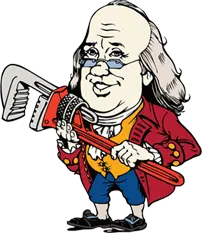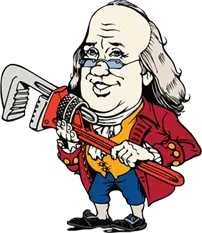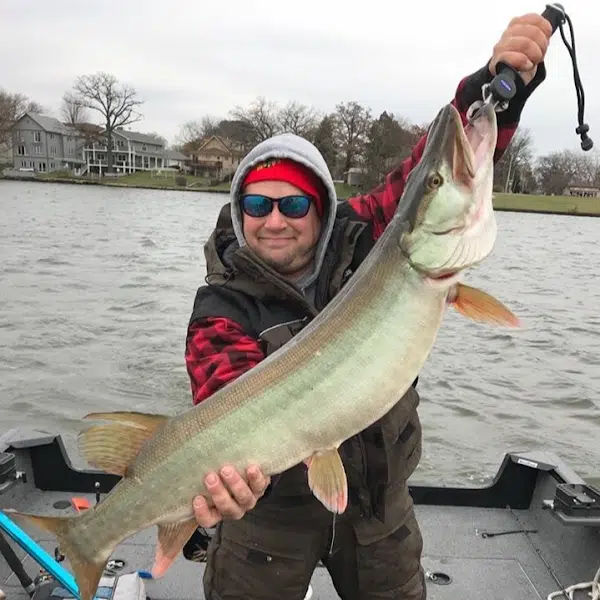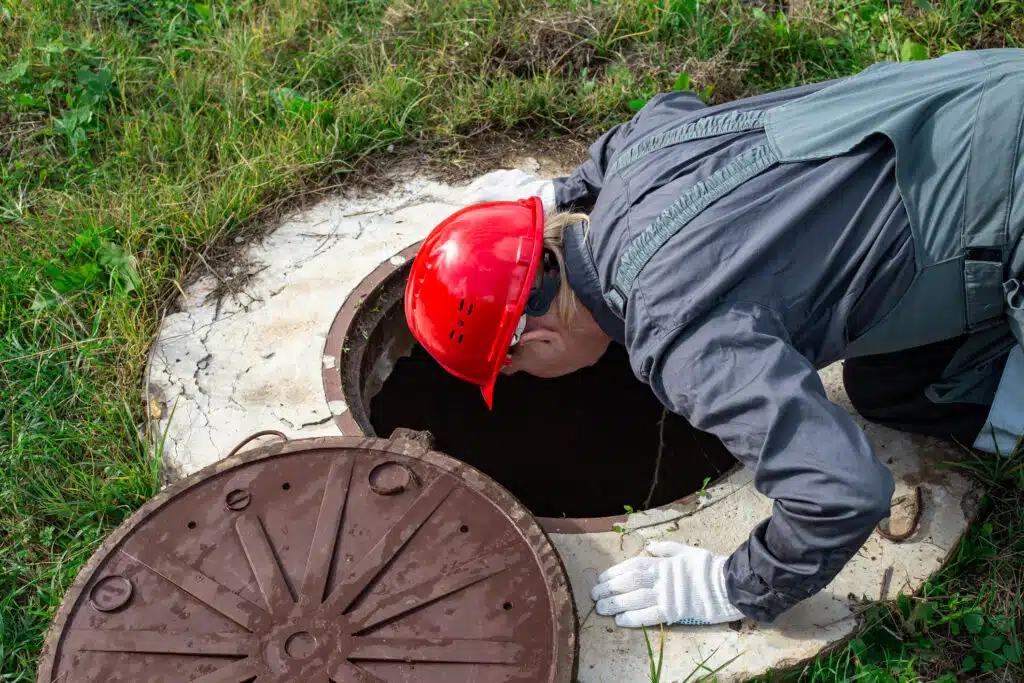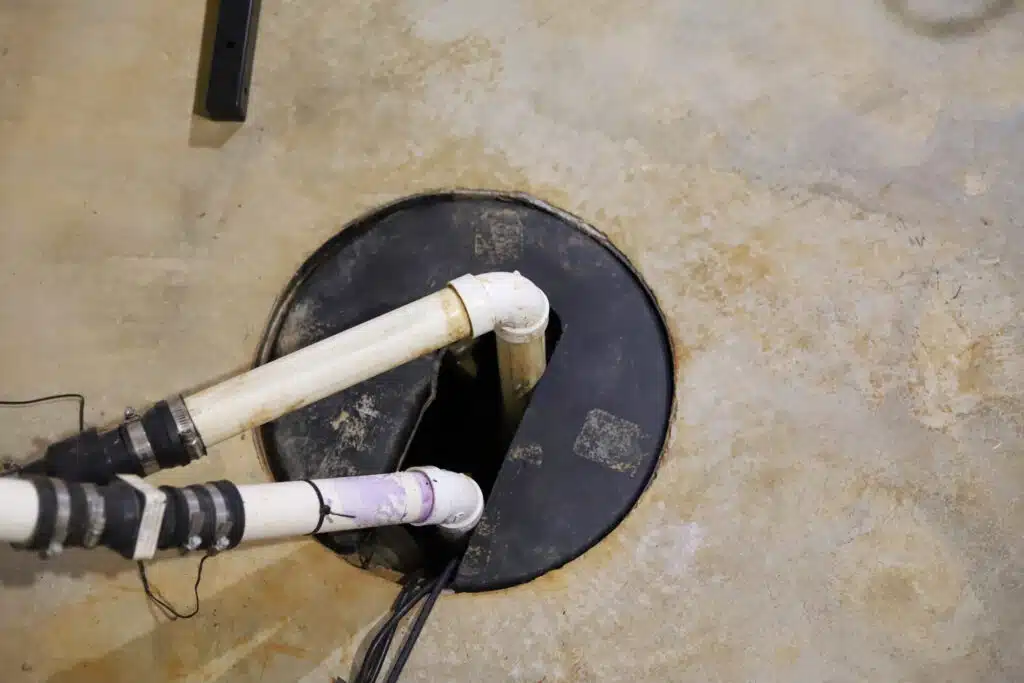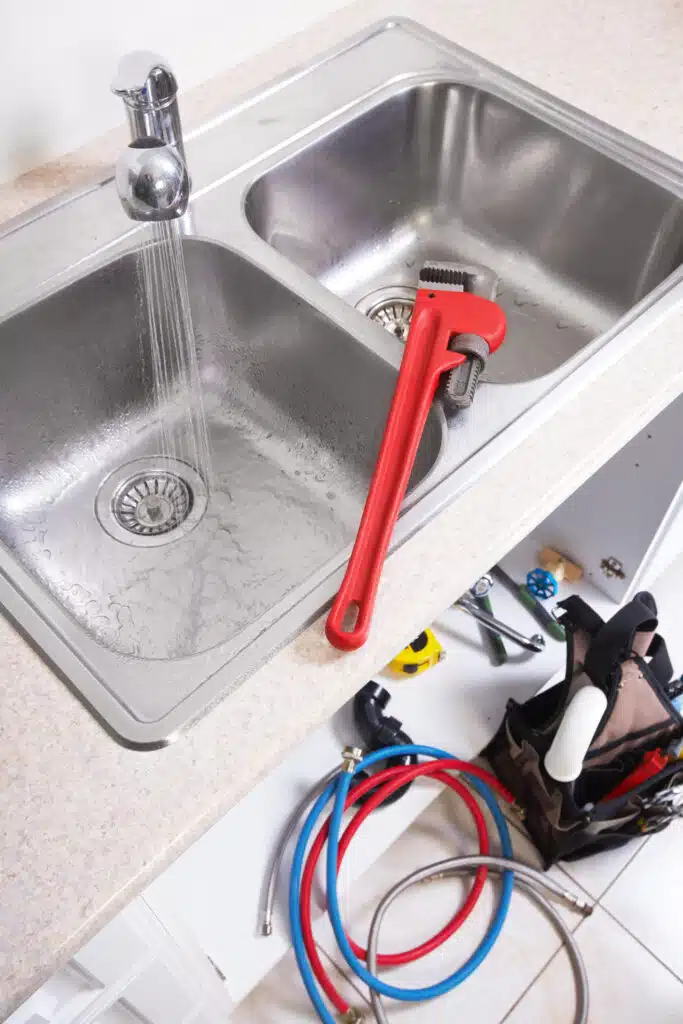A burst pipe is one of the most serious plumbing emergencies a homeowner can face. When a pipe ruptures, it can release gallons of water into your home, causing severe property damage, mold growth, and costly repairs. This issue is especially common during winter in Lancaster, PA, where freezing temperatures can put added stress on plumbing systems.
Understanding what causes pipes to burst can help you take proactive steps to prevent it from happening. From cold weather and high water pressure to aging pipes and blockages, several factors contribute to this problem. Fortunately, many of these issues are preventable with proper maintenance and professional plumbing services.
In this article, we’ll explore the top causes of a burst pipe and provide expert advice on how to prevent one. If you ever experience a plumbing emergency, Benjamin Franklin Plumbing of Lancaster, PA is available to provide fast, reliable assistance.
Freezing Temperatures and Pipe Expansion
One of the most common causes of a burst pipe is freezing temperatures. During winter, water inside pipes can freeze, causing it to expand. As the ice builds up, it creates pressure within the pipe, eventually leading to cracks or a complete rupture. This is especially problematic in Lancaster, PA, where temperatures frequently drop below freezing in the winter months.
Pipes that are most at risk include those located in unheated areas such as basements, crawl spaces, garages, and exterior walls. Poor insulation further increases the likelihood of freezing. If the pipe bursts, it can lead to flooding, water damage, and expensive repairs.
To prevent frozen pipes, homeowners should take a few precautions:
- Insulate exposed pipes in colder areas of the home. Foam pipe insulation or heat tape can help keep pipes warm.
- Keep cabinet doors open under sinks to allow warm air to circulate around plumbing.
- Let faucets drip slightly during extremely cold nights to keep water moving and reduce pressure buildup.
- Maintain indoor heating, even when away from home, to ensure temperatures don’t drop too low.
If a pipe does freeze or burst, it’s crucial to call Benjamin Franklin Plumbing of Lancaster, PA immediately. Their team can quickly assess the situation, thaw frozen pipes, and repair any damage to prevent further issues.
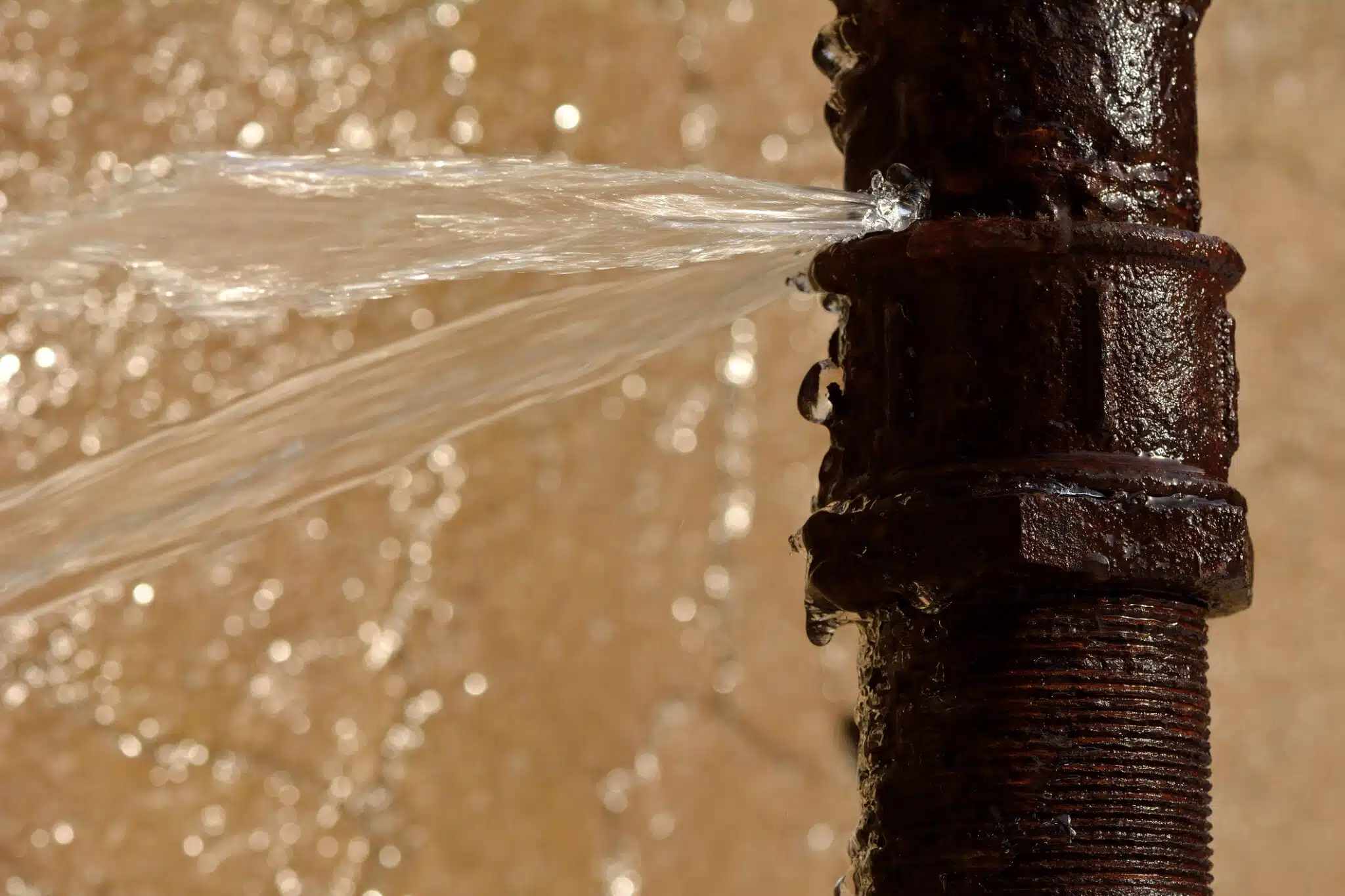
High Water Pressure Issues
Excessive water pressure can weaken pipes over time, increasing the risk of a burst pipe. While strong water pressure may seem beneficial for showers and faucets, it puts unnecessary strain on your plumbing system. Over time, this pressure can cause joints to loosen and pipes to crack, leading to leaks or complete pipe failure.
Most residential plumbing systems are designed to handle water pressure between 40–60 PSI (pounds per square inch). If the pressure exceeds this range, it can speed up pipe deterioration. Some common signs of high water pressure include banging or knocking noises in the pipes when turning faucets on or off, also known as water hammer. Sudden leaks or dripping faucets may also indicate pressure issues. Additionally, household appliances like dishwashers and washing machines may wear out faster than expected due to excessive pressure.
To prevent high water pressure from damaging your pipes, it’s important to test your water pressure regularly. A simple pressure gauge from a hardware store can help determine if your pressure is within the safe range. If the pressure is too high, installing a pressure regulator can help maintain proper levels. Scheduling regular plumbing inspections with Benjamin Franklin Plumbing of Lancaster, PA ensures your system is functioning correctly and prevents future issues.
Corrosion and Aging Pipes
A severe clog can create excessive pressure inside a pipe, increasing the risk of a burst pipe. When water flow is restricted, pressure builds up behind the blockage. If the pipe is already weakened due to age or corrosion, this added stress can cause it to rupture.
Common causes of clogs include grease, hair, soap scum, food particles, and mineral deposits. In some cases, tree roots can grow into underground pipes, leading to significant blockages. Slow drainage, gurgling noises, and frequent backups are warning signs of a clog that should not be ignored. If left untreated, clogs can lead to leaks, pipe bursts, and water damage.
To prevent blockages, avoid pouring grease or oil down the drain, as these substances solidify and stick to pipe walls. Using drain strainers can help catch hair and debris before they enter the plumbing system. Regular drain cleaning can also reduce the risk of buildup. Homes with hard water may benefit from a water softener to minimize mineral deposits inside pipes.
If multiple drains in your home are slow or backing up, it may indicate a deeper issue within the sewer line. A professional inspection can help identify and remove stubborn blockages before they cause major damage. For expert drain cleaning and plumbing maintenance, Benjamin Franklin Plumbing of Lancaster, PA offers reliable services to keep your pipes clear and in good condition.
Tree Root Intrusion
Tree roots are a hidden but serious cause of a burst pipe, especially in older homes with underground plumbing. Roots naturally seek out moisture, and if a pipe has even a small crack or leak, they can grow inside. Over time, the roots expand, restricting water flow and creating pressure buildup. If left unchecked, this can lead to a complete pipe collapse or rupture, resulting in costly repairs.
Common signs of tree root intrusion include slow drains, frequent clogs, and gurgling sounds coming from pipes. In severe cases, homeowners may experience sewage backups or foul odors from drains. Homes in Lancaster, PA, with mature trees planted near underground pipes, are particularly vulnerable to this issue.
Preventing tree root intrusion starts with proactive maintenance. Homeowners should be mindful of where trees are planted in relation to sewer and water lines. Routine sewer line inspections using camera technology can help detect early root growth before it becomes a major problem. Hydro jetting is another effective method that removes small root invasions and prevents them from worsening.
If you suspect tree roots are affecting your plumbing, professional intervention is necessary. Specialized root removal techniques, such as trenchless pipe repair, can restore your pipes without extensive digging. Addressing the problem early can help protect your plumbing system from severe damage and expensive repairs in the future.
Poor Installation and Cheap Materials
Faulty plumbing installation and subpar materials can significantly increase the risk of a burst pipe. If pipes are not installed correctly, weak joints and improper connections can lead to leaks, pressure imbalances, and eventual pipe failure. This issue is common in older homes with outdated plumbing or in homes where low-quality materials were used during construction or renovations.
Pipes made from inferior materials are more susceptible to corrosion, cracking, and wear. For example, older galvanized steel pipes can rust over time, while low-grade plastic pipes may become brittle and crack under pressure. Poor soldering in copper pipes or weak seals in PVC connections can also lead to slow leaks that eventually cause major water damage.
Ensuring your plumbing system is properly installed and maintained is the best way to prevent problems. Working with experienced, licensed plumbers ensures that pipes, fittings, and connections meet industry standards. Regular inspections can also help detect weak points before they turn into major issues. Homeowners planning renovations should invest in durable, high-quality materials like PEX or copper for long-term reliability.
If you suspect your home’s plumbing was poorly installed or contains low-quality materials, a professional inspection can help identify risks before they lead to costly repairs.
Shifting Soil and Foundation Issues
Changes in the ground beneath a home can put stress on pipes, increasing the risk of a burst pipe. Shifting soil, erosion, and foundation movement can cause underground pipes to bend, crack, or disconnect. Over time, even small shifts in the ground can create enough pressure to weaken pipes, leading to leaks or sudden pipe failure.
Several factors can cause soil movement, including heavy rainfall, drought conditions, and nearby construction. In Lancaster, PA, seasonal changes in moisture levels can lead to soil expansion and contraction, which may affect underground plumbing. Homes built on expansive clay soil or areas with poor drainage are particularly vulnerable to these issues.
Signs of shifting soil affecting your plumbing include unexplained drops in water pressure, recurring leaks, or visible cracks in your home’s foundation. If left unaddressed, these problems can escalate, leading to costly repairs and potential water damage. Proper drainage around the home, such as using gutters and grading the landscape away from the foundation, can help minimize soil movement.
Regular plumbing inspections can identify early signs of stress on pipes caused by shifting soil. If you notice plumbing issues related to ground movement, professional evaluation is recommended.
What to Do If a Pipe Bursts
A burst pipe can cause significant water damage in a short amount of time, leading to costly repairs and potential structural issues. Acting quickly is essential to minimize damage and restore your plumbing system. Knowing what steps to take can help prevent further complications and protect your home.
Step 1: Shut Off the Water Supply
The first and most crucial step is to turn off the main water supply. This stops water from flowing into your home and reduces the risk of further flooding. Most homes have a main shut-off valve located in the basement, garage, or near the water meter. If you are unsure where your shut-off valve is, take the time to locate it before an emergency occurs.
If the burst pipe is part of a localized system, such as under a sink or behind a toilet, shutting off the valve closest to the affected area may be enough. However, if you cannot identify the exact source of the problem, turning off the main supply is the safest option.
Step 2: Drain the Pipes and Protect Electrical Areas
Once the water is off, open all faucets and spigots in your home to drain any remaining water from the system. This relieves pressure and prevents additional leaks. Flushing toilets can also help clear out any water left in the pipes.
If the burst pipe is near electrical outlets, appliances, or your breaker box, turn off the electricity to the affected area. Water and electricity are a dangerous combination, and taking this step reduces the risk of electrical shock or fire hazards.
Step 3: Contain the Water and Prevent Further Damage
After shutting off the water and electricity, focus on containing the damage. Use towels, buckets, and a wet/dry vacuum to remove standing water. If water has spread across flooring or walls, act quickly to dry the area.
For leaks in ceilings, be cautious. Water buildup can cause ceilings to sag or collapse. If you notice bulging areas in the ceiling, place a bucket underneath and carefully puncture the area to release trapped water. This controlled drainage can help prevent a sudden collapse.
Step 4: Call a Professional Plumber for Repairs
Temporary fixes, such as pipe clamps, rubber patches, or waterproof tape, can help contain the leak for a short period, but they are not long-term solutions. A professional plumber is necessary to assess the full extent of the damage and perform permanent repairs.
Benjamin Franklin Plumbing of Lancaster, PA offers emergency plumbing services to respond quickly to burst pipe situations. Their skilled plumbers can replace broken pipes, reinforce weak areas, and ensure your plumbing system is restored to full functionality.
Step 5: Address Water Damage and Prevent Future Issues
After the plumbing repairs are complete, inspect your home for water damage and mold growth. Areas with prolonged moisture exposure may develop mold within 24 to 48 hours, which can pose health risks. Use fans, dehumidifiers, and open windows to dry out the affected area as quickly as possible.
To prevent future pipe bursts, schedule a plumbing inspection to identify potential weak points in your system. Regular maintenance, insulation for exposed pipes, and monitoring your water pressure can all help reduce the risk of another burst pipe incident.
Professional Help for Burst Pipes and Prevention
Dealing with a burst pipe requires fast action and expert repairs to prevent costly damage. While some plumbing issues can be prevented with regular maintenance, unexpected emergencies still happen. That’s where professional plumbing services become essential. A skilled plumber can quickly locate the source of the problem, repair or replace damaged pipes, and ensure your plumbing system is in top condition.
Benjamin Franklin Plumbing of Lancaster, PA provides emergency plumbing services to address burst pipes and other urgent issues. Their team has the expertise to repair leaks, replace corroded or aging pipes, and clear blockages that could lead to future pipe failures. In addition to emergency repairs, they offer preventive maintenance services, such as inspections, pressure regulation, and pipe insulation, to help homeowners avoid burst pipes altogether.
Taking a proactive approach to plumbing maintenance can save time, money, and stress. If you’re concerned about your pipes, professional assistance is just a call away.

FAQs About Burst Pipes
What are the first signs of a burst pipe?
The most common signs of a burst pipe include a sudden drop in water pressure, unusual sounds like banging or hissing in the walls, water stains on ceilings or walls, and unexpected puddles or flooding. You may also notice discolored water coming from your faucets, which can indicate rust or debris from a damaged pipe. If you notice any of these issues, shut off your water supply immediately and contact a plumber to assess the damage and prevent further issues.
Can a small leak lead to a burst pipe?
Yes, even a minor leak can weaken a pipe over time. If left unaddressed, pressure buildup and corrosion can cause burst pipe. A small leak may not seem like an emergency, but it can eventually lead to major structural damage and mold growth. Regular plumbing maintenance can help detect and repair small leaks before they escalate into costly problems.
How can I tell if my pipes are freezing?
Warning signs of freezing pipes include reduced water flow, frost forming on exposed pipes, and strange odors coming from drains. If you notice these signs, act quickly to prevent a pipe burst. Leave faucets dripping slightly to keep water moving, open cabinet doors to let warm air circulate, and use a space heater or hairdryer to warm the affected area. Taking these steps early can prevent ice buildup and reduce the risk of costly water damage.
What temperature causes pipes to freeze?
Pipes begin to freeze when temperatures drop to 32°F (0°C) or lower. However, the risk increases significantly when temperatures fall below 20°F (-6°C), especially if pipes are uninsulated or exposed to cold air. Factors such as wind chills, poor insulation, and extended exposure to freezing temperatures can accelerate the freezing process. Proper insulation and heating strategies can help protect your pipes in extremely cold conditions.
Does homeowners’ insurance cover burst pipes?
In most cases, homeowners’ insurance covers damage caused by a burst pipe, as long as it wasn’t due to negligence. Coverage typically includes water damage repairs, pipe replacement, and sometimes even temporary housing if the home is uninhabitable. However, policies vary, and some insurers may not cover damage if the homeowner failed to take preventive measures, such as insulating pipes in winter.




